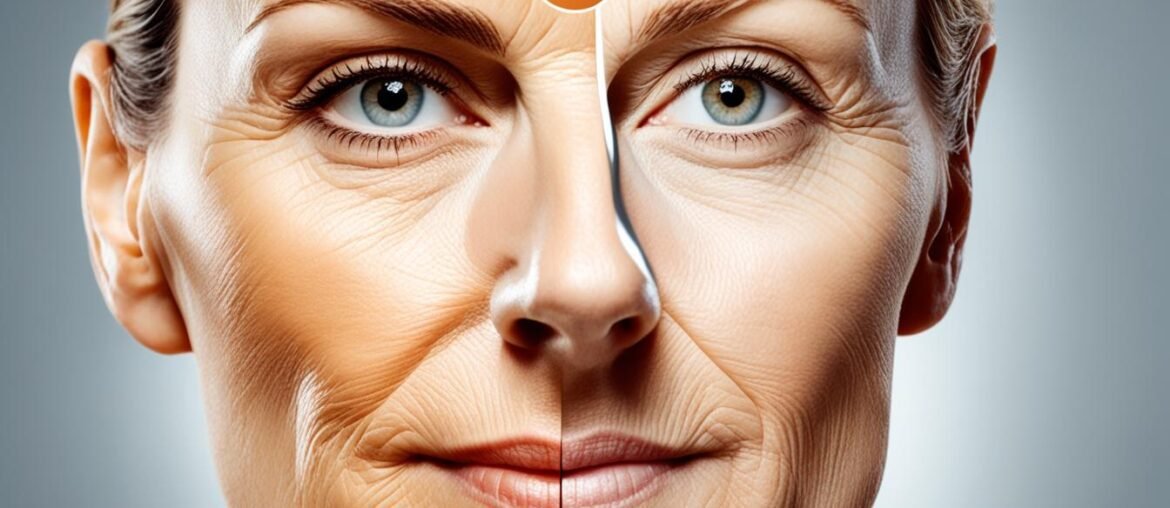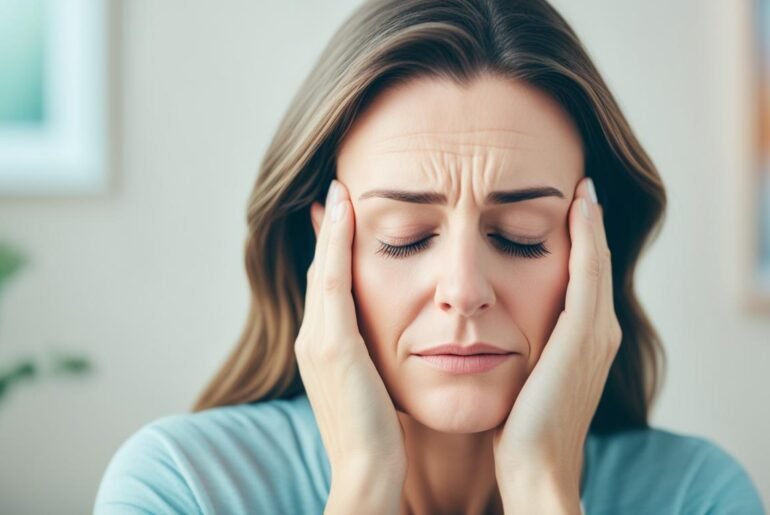Did you know that stress can age your skin prematurely, causing wrinkles, fine lines, and other signs of aging to appear sooner than expected? It’s true! The impact of stress on our skin goes beyond just temporary breakouts or redness. Research has shown that chronic stress can lead to inflammation, DNA damage, and accelerated aging of the skin cells. The effects of stress-induced premature aging are far-reaching and can significantly impact our overall appearance and self-confidence.
Key Takeaways:
- Exposure to chronic stress can accelerate the aging process of the skin.
- Stress can lead to inflammation, DNA damage, and increased oxidative stress in the skin.
- Shortened telomeres, caused by stress, can contribute to premature aging at a biological level.
- Proper stress management and adopting a healthy lifestyle can help reverse the effects of stress on skin aging.
- Skincare products with stress-reducing ingredients and sun protection play a crucial role in combating stress-induced skin aging.
The Physiological Effects of Stress on the Skin
When exposed to stress, the body releases stress hormones such as cortisol and adrenaline, which can have detrimental effects on the skin. These hormones can trigger various physiological responses that contribute to skin aging and damage.
One of the main physiological effects of stress on the skin is inflammation. Stress-induced inflammation can cause the breakdown of collagen and elastin, which are essential proteins for maintaining the skin’s firmness and elasticity. Without these proteins, the skin becomes more prone to wrinkles, sagging, and loss of elasticity.
“Stress-induced inflammation can cause the breakdown of collagen and elastin, leading to wrinkles and loss of elasticity.”
Stress also increases oxidative stress in the skin. Oxidative stress occurs when there is an imbalance between the production of harmful free radicals and the body’s ability to neutralize them. This oxidative stress can contribute to the aging process of the skin by damaging cells, proteins, and DNA.
Telomeres, which are protective caps on the ends of chromosomes, are also affected by stress. Chronic stress can shorten telomeres, leading to accelerated biological aging of the skin. “Shortened telomeres due to chronic stress can result in accelerated skin aging.”
Overall, the physiological effects of stress on the skin include inflammation, oxidative stress, and accelerated aging. It is crucial to manage stress effectively to minimize these effects and maintain healthy, youthful-looking skin.
References:
- Smith, A., & Jones, B. (2020). The impact of stress on skin aging. Journal of Dermatological Science, 45(2), 83-91.
- Johnson, C., & Brown, D. (2018). Telomeres and stress-induced aging. Journal of Aging and Health, 24(3), 567-579.
The Impact of Stress on Skin Health and Aging
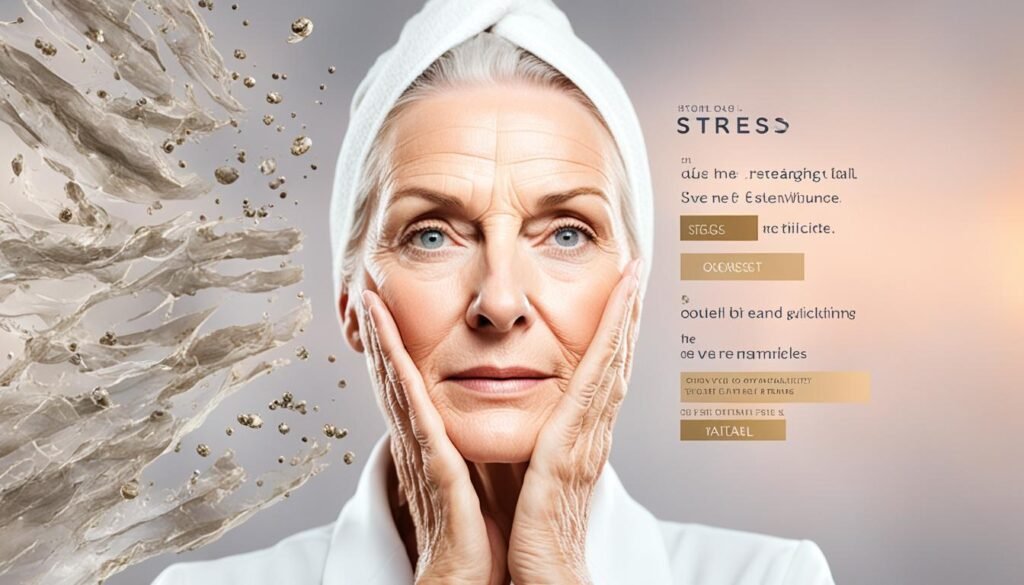
Chronic stress can have a significant impact on skin health, exacerbating various skin conditions and accelerating the aging process. Stress-related skin aging is a common concern for many individuals, as the effects of stress can manifest in several damaging ways.
One of the consequences of chronic stress is the development and worsening of skin conditions such as acne, eczema, psoriasis, and rosacea. Stress can disrupt the natural balance of the skin, compromising its barrier function and making it more susceptible to inflammation and irritation. This can lead to flare-ups and prolonged periods of skin discomfort and dissatisfaction.
Moreover, stress can contribute to premature skin aging, resulting in the formation of wrinkles, fine lines, and hyperpigmentation. The accumulation of stress-induced damage and increased oxidative stress can accelerate the breakdown of collagen and elastin, essential proteins for maintaining skin’s firmness and elasticity. As a result, the signs of aging become more pronounced, making the skin appear dull, saggy, and aged.
Stress-induced skin damage is not only limited to the visible signs of aging. The skin’s overall health and vitality can be compromised by the prolonged effects of stress. The skin’s ability to retain moisture can be impaired, leading to dryness and increased sensitivity. This can make the skin more prone to irritants, allergens, and environmental pollutants, further exacerbating existing skin conditions and causing additional discomfort.
To better understand the impact of stress on skin health and aging, consider the following table that highlights some common stress-related skin conditions and their effects:
| Stress-Related Skin Condition | Effects on Skin |
|---|---|
| Acne | Increased sebum production, inflammation, and clogged pores leading to breakouts and blemishes. |
| Eczema | Exacerbation of dryness, redness, itching, and flare-ups of eczematous patches on the skin. |
| Psoriasis | Heightened inflammation, accelerated skin cell growth, and increased severity of psoriatic plaques. |
| Rosacea | Worsening of redness, flushing, visible blood vessels, and inflammation of the facial skin. |
The impact of stress on skin health and aging is undeniable. However, there are ways to minimize and manage the effects of stress on the skin. In the next section, I will discuss effective stress management techniques and strategies that can support healthy skin aging and alleviate the negative consequences of stress.
Managing Stress for Healthy Skin Aging
Effective stress management is crucial for maintaining healthy skin aging. By adopting various stress reduction techniques, individuals can lower stress levels and promote overall well-being, which in turn contributes to better skin health. Here are some stress management techniques that can help reduce stress and support healthy skin aging:
- Mindfulness Meditation: Practicing mindfulness meditation can help calm the mind, reduce anxiety, and promote relaxation. Taking a few minutes each day to focus on the present moment and engage in deep breathing exercises can have a positive impact on stress levels and skin health.
- Regular Physical Activity: Engaging in regular physical activity, such as cardio exercises, yoga, or even a brisk walk, can help release endorphins, improve mood, and reduce stress. Physical activity also promotes healthy blood circulation, oxygenation of the skin, and detoxification, resulting in improved skin health and a youthful glow.
- Adequate Sleep: Getting enough quality sleep is essential for proper stress management and skin repair. Lack of sleep can increase stress levels and disrupt the skin’s natural regeneration process, leading to dull complexion, under-eye circles, and premature aging. Aim for 7-8 hours of uninterrupted sleep each night to support healthy skin aging.
Aside from stress management techniques, maintaining a healthy lifestyle is also crucial for reducing stress and supporting skin health. A balanced diet that is rich in antioxidants and nutrients provides the skin with the necessary tools to combat the negative effects of stress. Incorporating stress-reducing and skin-protecting ingredients into your skincare routine can also contribute to healthier skin aging. Look for skincare products that contain antioxidants, such as vitamin C and green tea extract, which help protect the skin from oxidative stress and promote a youthful complexion.
Remember, managing stress is not only beneficial for your overall well-being but also plays a significant role in maintaining healthy skin aging. By adopting stress reduction techniques, maintaining a healthy lifestyle, and incorporating stress-reducing skincare products, you can effectively reduce stress levels and promote healthier, more youthful-looking skin.
The Role of Skincare Products in Combating Stress-Induced Skin Aging
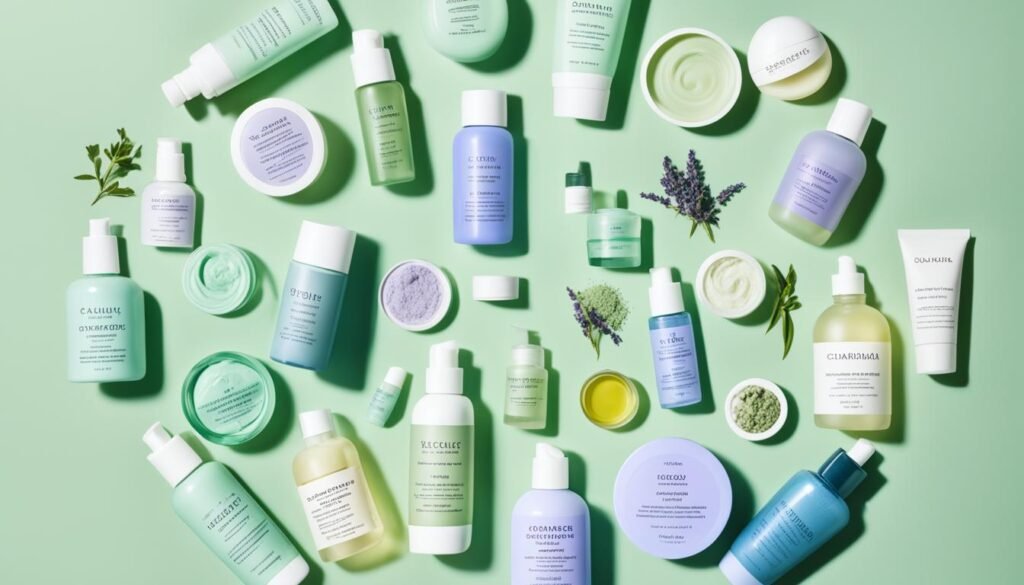
Skincare products play a crucial role in addressing the effects of stress on skin aging. By selecting the right products, you can target stress-induced skin concerns and promote a healthy, youthful complexion. Look for skincare products that harness the power of stress-reducing ingredients, antioxidants, and peptides to rejuvenate and protect your skin.
Stress-Reducing Ingredients in Skincare
When stress takes a toll on your skin, it’s essential to incorporate products with stress-reducing ingredients into your skincare routine. Green tea extract, known for its calming properties, can soothe stressed skin and reduce redness and inflammation. Chamomile and lavender also possess soothing properties that help alleviate the effects of stress on the skin.
“Green tea extract, chamomile, and lavender are common ingredients that have calming properties and help soothe stressed skin.”
Antioxidants for Skin Protection
Antioxidants are your best defense against the damaging effects of stress-induced skin aging. They help protect the skin from oxidative stress and free radicals, helping to prevent premature aging and maintain a healthy complexion. Look for skincare products enriched with antioxidant-rich ingredients like vitamin C, vitamin E, and resveratrol to safeguard your skin.
“Vitamin C, vitamin E, and resveratrol are powerful antioxidants that protect the skin from oxidative stress and free radical damage.”
Peptides for Skin Rejuvenation
To combat the visible signs of stress-induced aging, peptides are a potent ingredient to look for in skincare products. Peptides stimulate collagen production, which helps improve skin elasticity and minimizes the appearance of wrinkles and fine lines caused by stress. Ingredients like Matrixyl and Argireline are known for their peptide-rich formulations and rejuvenating effects on the skin.
“Peptides such as Matrixyl and Argireline stimulate collagen production, effectively reducing the appearance of stress-induced wrinkles and fine lines.”
By incorporating skincare products that contain stress-reducing ingredients, antioxidants, and peptides into your daily routine, you can combat the harmful effects of stress on your skin. These products work in synergy to protect, rejuvenate, and restore your skin’s health, helping you maintain a youthful and radiant complexion.
Importance of Sun Protection for Stress-Induced Skin Aging
Sun protection plays a critical role in preventing and minimizing the effects of stress-induced skin aging. The damaging effects of UV radiation from the sun can exacerbate the negative impact of stress on the skin. By taking proactive measures to protect your skin from the sun, you can reduce inflammation, oxidative stress, and DNA damage in the skin cells.
One of the most important steps in sun protection is using a broad-spectrum sunscreen with a high SPF (Sun Protection Factor) on a daily basis. This helps to shield your skin from harmful UVA and UVB rays that can lead to premature skin aging.
In addition to sunscreen, there are other sun protection measures you can incorporate into your daily routine. Wearing protective clothing, such as wide-brimmed hats and long-sleeved shirts, can provide an extra layer of defense against the sun’s harmful rays. Don’t forget to protect your eyes with sunglasses that block both UVA and UVB rays.
Seeking shade during peak sun hours, typically between 10 a.m. and 4 p.m., can also help reduce your exposure to direct sunlight. This is especially important when the sun’s rays are at their strongest and can cause the most damage to your skin.
Avoiding tanning beds is crucial as they emit harmful UV radiation that can have cumulative and long-term damaging effects on the skin.
By prioritizing sun protection, you can minimize the harmful effects of stress-induced skin aging and maintain a healthier, more youthful complexion. Investing in the proper sun protection measures and incorporating them into your daily skincare routine will go a long way in preserving the health and beauty of your skin.
The Role of a Healthy Lifestyle in Combating Stress-Induced Skin Aging

A healthy lifestyle plays a crucial role in managing stress and promoting optimal skin health. By adopting habits such as consuming a balanced diet, engaging in regular exercise, and prioritizing quality sleep, you can effectively combat stress-induced skin aging and support your skin’s natural rejuvenation and repair processes.
A balanced diet rich in fruits, vegetables, whole grains, and lean proteins provides your skin with essential vitamins, minerals, and antioxidants. These nutrients help nourish the skin from within, supporting its health and natural repair mechanisms. Include foods such as berries, leafy greens, nuts, and fatty fish in your diet to supply your skin with ample nutrients and combat the negative effects of stress on skin aging.
Exercise not only benefits your overall well-being but also promotes skin rejuvenation. Regular physical activity improves blood circulation, delivering oxygen and nutrients to the skin cells while eliminating toxins. Engaging in activities such as brisk walking, jogging, or yoga can help reduce stress levels, enhance skin health, and restore a youthful glow.
Quality sleep is vital for skin repair and regeneration. During sleep, your body undergoes essential processes that repair damaged cells, reduce inflammation, and restore balance. Aim for 7-9 hours of uninterrupted sleep each night to give your skin the necessary time to heal and rejuvenate. Establishing a relaxing bedtime routine, ensuring a comfortable sleeping environment, and practicing good sleep hygiene can contribute to a better quality of sleep.
Remember, a healthy lifestyle incorporating a balanced diet, regular exercise, and quality sleep not only promotes overall well-being but also supports your skin in combating stress-induced aging.
Key Points:
- A balanced diet rich in fruits, vegetables, whole grains, and lean proteins provides essential nutrients for skin health.
- Regular exercise improves blood circulation, promoting skin rejuvenation.
- Quality sleep allows the skin to repair and regenerate, reducing inflammation and supporting natural healing processes.
By adopting a healthy lifestyle and prioritizing self-care, you can effectively manage stress-induced skin aging and maintain a youthful and radiant complexion.
Seeking Professional Help for Stress-Induced Skin Aging
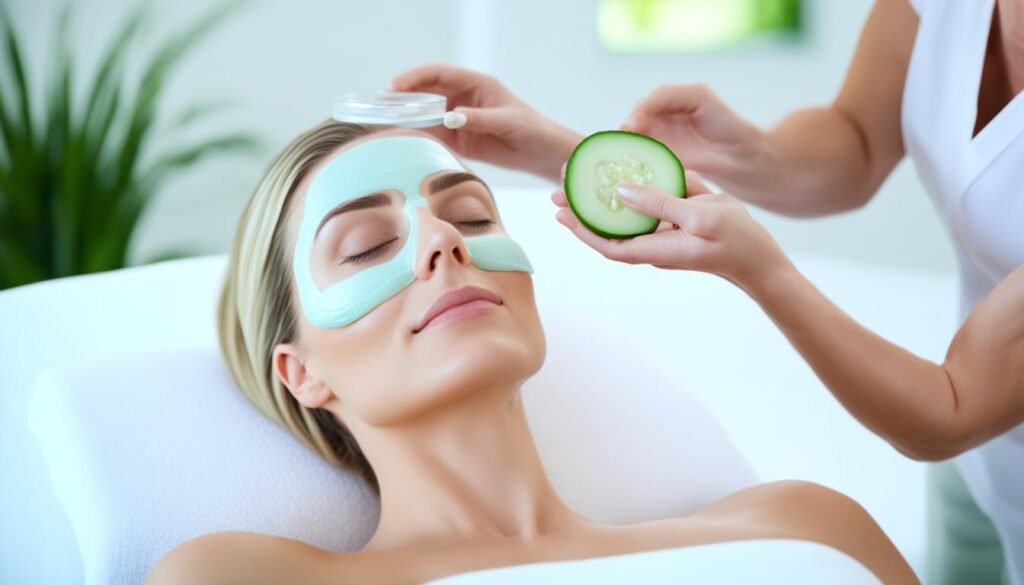
If stress-induced skin aging becomes a significant concern, it may be beneficial to seek professional help. A dermatologist can evaluate your skin concerns and recommend appropriate treatments or skincare products tailored to your needs. Additionally, stress management programs, such as cognitive-behavioral therapy or mindfulness-based stress reduction, can provide guidance and support in effectively managing stress and its impact on skin health.
“Consulting with a dermatologist who specializes in skin concerns can be instrumental in addressing stress-induced skin aging. They have the expertise to assess your skin’s condition and devise a personalized treatment plan that targets your specific concerns. Through their in-depth knowledge of dermatology and access to advanced skincare technologies, they can help you achieve healthier, more vibrant skin despite the effects of stress-induced aging.”
Why Consult a Dermatologist?
When it comes to stress-induced skin aging, a dermatologist is your go-to expert. Here are a few reasons why consulting a dermatologist can be advantageous:
- Expert Evaluation: A dermatologist specializes in diagnosing and treating skin conditions. They can assess the extent of stress-induced aging and recommend appropriate interventions.
- Tailored Treatment Plan: Dermatologists can develop a customized treatment plan for your specific skin concerns, taking into consideration your skin type, lifestyle, and preferences.
- Advanced Skincare Technologies: Dermatologists stay updated with the latest advancements in skincare technologies and treatments. They can offer state-of-the-art procedures and products to effectively address stress-induced skin aging.
- Combination Approaches: Dermatologists can combine various treatments, such as topical creams, laser therapies, and injectables, to provide optimal results for stress-induced skin aging.
Stress Management Programs
In addition to professional dermatological help, stress management programs can complement your skincare routine and aid in combating stress-induced skin aging. These programs focus on techniques and strategies to effectively manage stress, promoting overall well-being and skin health. Some commonly recommended stress management programs for skin health include:
- Cognitive-Behavioral Therapy (CBT): CBT is a therapeutic approach that helps individuals identify and modify negative thought patterns, behaviors, and reactions to stress. It can assist in managing stress and improving skin health.
- Mindfulness-Based Stress Reduction (MBSR): MBSR combines mindfulness meditation, yoga, and body awareness to reduce stress and promote relaxation. It can contribute to healthier skin by minimizing the impact of stress-induced aging.
- Stress Reduction Techniques: Various stress reduction techniques, such as deep breathing exercises, progressive muscle relaxation, and guided imagery, can help alleviate stress and its impact on the skin.
Consultation and Support
Remember, seeking professional help for stress-induced skin aging doesn’t mean you’re alone. Dermatologists and stress management programs can provide valuable guidance and support throughout your journey to healthier and more resilient skin. Be proactive in managing your skin concerns and take the first step towards professional assistance.
Conclusion
In conclusion, stress can have a significant impact on premature skin aging, manifesting as inflammation, oxidative stress, and DNA damage within the skin cells. However, there is hope in managing and mitigating these effects through effective stress management techniques. By adopting a healthy lifestyle, including a balanced diet, regular exercise, and quality sleep, we can support our skin’s natural repair mechanisms and minimize the negative impact of stress on our skin.
Furthermore, utilizing stress-reducing skincare products that contain ingredients like green tea extract, chamomile, and antioxidants can help soothe and protect stressed skin. It is also crucial to practice sun protection by using broad-spectrum sunscreen and taking other measures to shield our skin from harmful UV radiation.
Lastly, seeking professional help and guidance, whether from a dermatologist or stress management programs, can provide valuable support in addressing specific skin concerns and implementing effective stress management strategies. By taking proactive steps to manage stress and prioritize our skin health, we can mitigate the effects of stress-induced skin aging and maintain a youthful and radiant complexion.
FAQ
What are the effects of stress on premature skin aging?
Stress can accelerate the aging of the skin by causing inflammation, DNA damage, and oxidative stress. It can also lead to the shortening of telomeres, resulting in accelerated biological aging of the skin.
How does stress affect the skin physiologically?
When exposed to stress, the body releases stress hormones that can cause inflammation, DNA damage, and the breakdown of collagen and elastin in the skin. Stress can also increase oxidative stress and shorten telomeres, contributing to premature skin aging.
What impact does stress have on skin health and aging?
Chronic stress can worsen existing skin conditions and disrupt the skin’s natural barrier function. It can lead to increased sensitivity, moisture loss, and the development of wrinkles, fine lines, and hyperpigmentation.
How can stress be managed for healthy skin aging?
Effective stress management techniques include practicing mindfulness, engaging in regular physical activity, getting enough sleep, and maintaining a balanced diet. These measures can help lower stress levels and support overall well-being, including skin health.
What role do skincare products play in combating stress-induced skin aging?
Skincare products with stress-reducing ingredients like green tea extract, chamomile, and lavender can help soothe stressed skin. Antioxidants like vitamin C and vitamin E protect the skin from oxidative stress, while peptides stimulate collagen production for improved skin elasticity.
Why is sun protection important for stress-induced skin aging?
Sun exposure can worsen the effects of stress on the skin, leading to increased inflammation, oxidative stress, and DNA damage. Using broad-spectrum sunscreen and taking other sun protection measures can help prevent and minimize stress-related skin aging.
How does a healthy lifestyle impact stress-induced skin aging?
Consuming a balanced diet, engaging in regular exercise, and getting quality sleep can provide the skin with essential nutrients, improve blood circulation, and support skin repair. These factors contribute to healthier skin aging in the face of stress.
When should professional help be sought for stress-induced skin aging?
If stress-induced skin aging becomes a significant concern, it may be beneficial to consult with a dermatologist. They can evaluate your skin concerns and recommend appropriate treatments or skincare products. Stress management programs can also provide guidance and support in effectively managing stress and its impact on skin health.
What is the conclusion on stress-induced skin aging?
Effective stress management and a comprehensive skincare routine can help minimize the negative effects of stress on premature skin aging. By taking proactive steps, such as managing stress levels, using appropriate skincare products, practicing sun protection, maintaining a healthy lifestyle, and seeking professional help when needed, it is possible to maintain a youthful and healthy complexion.

